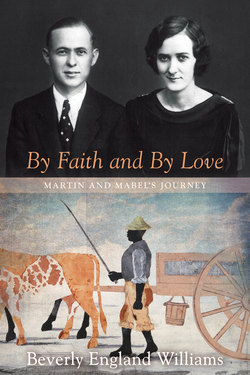Читать книгу By Faith and By Love - Beverly E. Williams - Страница 13
7
ОглавлениеA man and a woman from poor families in the South, who had never been farther away from home than New York City, were spending their honeymoon sightseeing in London. They had sailed to England on the ship Britannic and were scheduled from the port of Liverpool to Rangoon, Burma on the Henderson Line steam ship Amarapoora.
Mabel’s letters home were filled with both excitement about all they were seeing and homesickness for the family at Christmas, her first away from Alabama.
Steam Ship Amarapoora Christmas Eve, 1933, 9:30 p.m.
Dear Family,
How I would like to be triplets tonite—in Birmingham, Miami, and here. I have been wondering what you all are doing right now. Martin and I have just come up to the lounge from the playroom. The children aboard haven’t had any more fun, I know, than about a dozen grown-ups have had tonight. After dinner we began decorating an artificial tree, and put paper streamers above. In the process we got very playful, draping each others’ ears with tinfoil icesycles (sp?) Two of the young fellows got down on their knees—hard on tuxedos!—and played with some of the toys. Then one of them wrapped the other up as a gift. He looked like last year’s present.
This morning M. led the worship service. The captain, as well as others, said it was a lovely service. Martin used the Christmas story as Luke recorded it and spoke of what it can mean in our workaday world of today.
Just before sunset we went up to the ship’s prow and saw oodles of flying fish. They move like planes and their bodies shine like silver in the sunlight.
December 26—Christmas was a happy day for us, mixed with nostalgic memories of home and wondering what you were doing. We opened your package first; many thanks! M. gave me a beautiful ship picture; I had bought him a black leather wallet in London. We gave ourselves a large scrapbook to record our memories of this journey.
The English “Father Christmas” came into the children’s room with a bag of gifts and candy. It was a treat for the adults to watch them open their presents. That afternoon the captain invited the passengers on the bridge. It was so interesting to find out what all the gadgets were used for, and to watch the pilot. Dinner was a gala affair, with paper hats and whistles at our plates. The English celebrate Christmas a bit like we do New Year’s.
When the ship made a stop in Egypt, passengers were allowed to go ashore for the afternoon. Mabel knew that her father, whose ancestors had come from Scotland, would enjoy hearing about one exchange:
The shopkeeper called all the white-skinned tourists “Mr. McGregor” or “Mrs. McGregor,” as if we all came from Scotland. To Martin he said, “Hello, Buffalo Bill!” “How do you know I am not Mr. McGregor?” Martin teased. “I tell by your face—rich American.”
At sunset we saw camels crossing the plains. In the distance mountain peaks pierced low hanging clouds. My only regret was that I didn’t get to ride a camel!
Friends had wakened them at 4:00 a.m. to see the Southern Cross,
a beautiful Constellation. We stayed up to see the first sunrise we’ve watched at sea. Our last evening on board was the prettiest. The whole western sky was crimson. The full moon came slowly out of the water, almost red.
On New Year’s Day, 1934, Martin wrote a hurried note to his other family, his new in-laws, telling them that the mail boat would arrive in a few minutes. They were glad to be so close to the end of their voyage “and yet the old boat has come to seem almost like home.”
Mabel knew that her family would want to know about their last day on board the ship:
January 2, 1934
Yesterday at 5:00 a.m. we went on deck to see the gold sunrise on the spire of the Sule [SOO-LEE] Pagoda, the largest in Burma. That was proof to us that we had left the Indian Ocean and had entered the Irrawaddy River. Near enough to shore to see lights, and campfires in the woods. One of the loveliest sights was a butterfly-wing shaped sailboat gliding along in the path of the moon.
The newlyweds said farewell to the friends they had made during the long sea voyage and spent a few days in the capital city of Rangoon. Nothing was familiar among the sounds and sights and smells of an Asian city, warm and muggy even in early January. Mabel and Martin met church coworkers from the city and those from surrounding towns who had come to greet them. It took several and nights before the rocking of the ship gave way to “land legs.”
The couple’s next letter home was postmarked Bhamo (BAH-MOW), a river town near the China border where they were to live and work. They had taken the train from Rangoon to Mandalay and then up the Irrawaddy River by boat.
